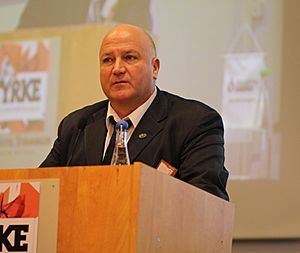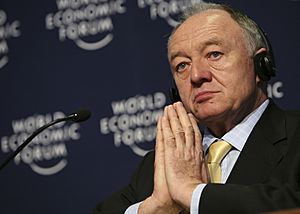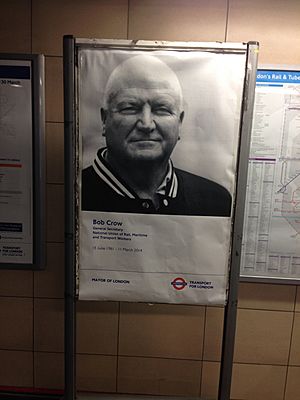Bob Crow facts for kids
Quick facts for kids
Bob Crow
|
|
|---|---|

Crow at Industri Energi's Styrke conference in 2012
|
|
| Born |
Robert Crow
13 June 1961 Epping, Essex, England
|
| Died | 11 March 2014 (aged 52) Whipps Cross, London, England
|
| Nationality | English |
| Occupation | Trade union leader |
| Spouse(s) | Geraldine Horan (divorced) |
| Children | 2 |
Robert Crow (born 13 June 1961 – died 11 March 2014) was an English trade union leader. He was the General Secretary of the National Union of Rail, Maritime and Transport Workers (RMT) from 2002 until he passed away in 2014. He also served on the General Council of the Trades Union Congress (TUC). Bob Crow described himself as a "communist/socialist" and was a key figure in the "No to EU – Yes to Democracy" campaign.
Crow started working for London Transport in 1977 and quickly became involved in trade unions. He was known as part of the "Awkward Squad," a group of left-wing union leaders who became powerful around 2002. Under his leadership, the RMT union grew a lot, from about 57,000 members in 2002 to over 80,000 in 2008. This made it one of the fastest-growing trade unions in Britain.
Bob Crow was a person who caused strong opinions in British politics. His supporters saw him as a champion for the working class and a very successful union leader. However, others, like Boris Johnson, felt he caused problems for London with strikes.
Contents
His Early Life
Bob Crow was born in Epping, Essex, to Lillian and George Crow. He was proud of his working-class background throughout his life. His father was a docker who taught him to read both the Morning Star (a left-wing newspaper) and the Financial Times (a business newspaper), but to question everything in the latter. His father was also a lifelong member of a trade union.
His family later moved to Hainault, London. Bob left school at 16 and started working for London Transport. This is where he first got involved in union activities. His first jobs included making tea and cutting trees, before he moved on to heavy track repair. In 1983, he was chosen as a local representative for the National Union of Railwaymen (NUR). By 1985, he became a national officer for track workers in the NUR.
Bob Crow said that starting his career when powerful union leaders were in charge, and working in a nationalised industry (owned by the government) with people who had worked there for many years, helped shape his beliefs. He loved soul music as a teenager and often danced to jazz-funk and reggae.
Leading the Way for Workers
In 1990, two unions, the National Union of Railwaymen and the National Union of Seamen, joined together to form the National Union of Rail, Maritime and Transport Workers (RMT). The next year, Crow became the London Underground representative on the union's National Executive. In 1991, he became the assistant general secretary. Then, on 14 February 2002, the union members voted for Bob Crow to become the new general secretary, taking over from Jimmy Knapp. He received many more votes than the other candidates.
Six weeks before he became general secretary, on 1 January 2002, Bob Crow was attacked outside his home by two men. He thought it might have been people hired by employers, but others thought it could have been members of far-right groups.
Bob Crow was also a member of the General Council of the Trade Union Congress. From 2006 until his death, he was on the Executive Board of the International Transport Workers Federation, which is a global union for transport workers. Under his leadership, the RMT also joined the World Federation of Trade Unions.
When he became general secretary, the transport industry was doing very well. This gave him a strong position to negotiate for his union members. The RMT was one of the few British trade unions that still had a lot of power to influence things through industrial action.
His Political Beliefs
Bob Crow called himself a "communist/socialist." From 1983 to 1997, he was a member of the Communist Party of Great Britain and then the Communist Party of Britain. He often quoted Che Guevara, a famous revolutionary, saying: "Hasta la victoria siempre!" which means "Forever onwards until the victory!" He even had a statue of the communist leader Vladimir Lenin in his office.
He believed that the goals of a trade unionist were to make sure workers had "Job security, being safe, best possible pay, best possible conditions, decent pensions, and a world that lives in peace."
He briefly joined Arthur Scargill's Socialist Labour Party in 1997. He always supported Scargill, especially for his dedication to trade unionism. Crow did not agree with the idea that Scargill was to blame for the miners' defeats in the 1980s.
Crow was also a founding member of the Trade Unionist and Socialist Coalition. He believed that all socialist parties should work together.
Fighting for a New Workers' Party
Bob Crow was a strong critic of Tony Blair, who was the leader of the Labour Party and Prime Minister. Crow felt that Blair's government wasted opportunities and increased the gap between rich and poor. He thought Blair's policies were very similar to those of the Conservative Party.
In 2007, Crow called for a new political party that would truly represent the working class. In 2013, he accused the Labour leader at the time, Ed Miliband, of not caring about unions. He again urged trade unions to stop supporting Labour and create a new party to challenge what he called the "anti-worker" plans of the main political parties.
RMT Strikes and Actions
Bob Crow believed that Transport for London (TfL) was being unfair with its pay offers to workers. He described their approach as "confrontational."
When the RMT announced a 48-hour strike in June 2009, Crow explained why. He said that London Underground bosses were threatening to break agreements that protected jobs and would not promise that no one would lose their job. He believed up to 4,000 jobs were at risk because of cuts.
Crow wrote that the RMT expected managers to stick to existing job security agreements. He added that the union would not be doing its job if it allowed the Tube to treat its members unfairly. He said, "It wasn't our members who created the downturn and we will not be bullied into accepting that they should be forced to pay for an economic crisis that was cooked up by the bankers and the politicians."
Some people saw Crow as a moderate leader within the RMT, meaning he wasn't the most extreme. However, he was also criticised by some RMT members for strongly supporting the lowest-paid workers, like cleaners, whose jobs were often given to outside companies. Some higher-paid members felt this was not efficient.
Views on Europe
In March 2009, Bob Crow announced that the RMT would lead a campaign called "No to EU – Yes to Democracy" for the 2009 European Parliament elections. This group wanted a Europe made of "independent, democratic states that value its public services and does not offer them to profiteers; a Europe that guarantees the rights of workers and does not put the interests of big business above that of ordinary people."
As the leader of this campaign, Crow said he was "not against workers coming into the country." However, he was against "two workers from different countries competing against each other on different rates of pay." He believed their main goal would be to support working people and help save industries from being privatised (sold to private companies).
The "No2EU" campaign received 153,236 votes, which was more than the RMT's total membership at the time. They got 1% of the votes in Britain, but this was not enough to win a seat in the European Parliament.
Questions About His Salary
The BBC reported Bob Crow's annual salary as £145,000. However, a journalist from The Independent pointed out that the correct figure for his salary was around £96,000. Crow himself confirmed this in an interview. According to official figures from 2012, his basic salary at the RMT was £89,805. The union also paid money towards his National Insurance and pension. He did not have a car or driver provided by the union. When asked about his salary, Crow said, "I'm worth it." The Telegraph newspaper agreed, saying he "represented the interests of his members with a single-minded determination" and that he "wanted the best deal for the people who paid his salary – and they continued to reward him because he delivered it."
His Final Years
After the death of former Prime Minister Margaret Thatcher in April 2013, Crow made a strong comment about her. In January 2014, Crow went on a cruise from Barbados to Brazil and was photographed by paparazzi on Copacabana Beach. Crow joked, "What do you want me to do? Sit under a tree and read Karl Marx all day?"
In February 2014, a reporter asked him if he felt sorry for commuters affected by strikes. He replied, "Course I feel sorry for them. But they know our fight isn't with them. It's with Transport for London. And what do they expect a trade union to do? If you join one you expect it to fight for your rights and your job – and that's what I'm doing."
Bob Crow passed away in the early hours of 11 March 2014 at Whipps Cross University Hospital after suffering a heart attack.
His Personal Side
Bob Crow believed the UK should leave the European Union. Since he was a child, he supported Millwall Football Club, and he kept a photo of the club in his office. He was also a fan of boxing. In a 2011 interview, he said he worked out six days a week and could lift heavy weights. He had a pet Staffordshire bull terrier named Castro, after the Cuban leader Fidel Castro.
The Guardian newspaper described Crow as having "a very keen brain and strong emotional intelligence." The New York Times called him both "confrontational and charismatic," as well as "sharp and shrewd." Crow was very interested in the weather and owned a barometer (a tool to measure air pressure). He told the press that if he hadn't become a trade unionist, he would have liked to be a weather man.
Even though he was often seen as a radical socialist, Bob Crow was actually very practical. He was described as "too shrewd for doctrine," meaning he didn't stick strictly to political theories if it didn't make sense. For example, he said he would support the Conservative Party if it meant the railways would be owned by the government again.
Crow's marriage to Geraldine Horan ended in divorce. They had a daughter, Kerrie-Anne, and two grandsons. He later had a long-term relationship with Nicola Hoarau, and they had another daughter, Tanya.
Crow had a distinctive accent from south-east England. He was often seen at Millwall FC games wearing his trademark flat cap. He lived in a three-bedroom council house (public housing) in Woodford Green, London. When asked why he lived in a council house despite his high income, Crow said, "I was born in a council house, as far as I'm concerned I will die in one."
He sometimes played along with how the press portrayed him, for example, by calling bankers greedy "spivs" (a term for someone who makes money dishonestly). Once, a journalist asked him how he would feel if his children chose careers in banking. He said he was happy for them to live their lives. He even revealed that his brother was a stockbroker, but he was more concerned that his brother supported Arsenal F.C., a rival football team.
In 2011, Bob Crow's lawyers contacted the Metropolitan Police because he suspected that journalists might have had access to private information about him and his union's activities.
What People Remembered About Him
Bob Crow had a strong impact on British politics. He became known as "the left's favourite firebrand and the right's favourite villain." To his supporters, he was a working-class hero who successfully stood up for the rights of RMT members. He was seen as very successful in his job. During his time as RMT leader, membership grew from 59,000 to 78,000. Also, London tube drivers' pay increased to £52,000, which was nearly double the average national wage.
Former Mayor of London Ken Livingstone said that "The only working-class people who still have well-paid jobs in London are [RMT] members." The Guardian newspaper said that he "managed to popularise the cause of trade unions at a time of declining membership and increasing hostility." BBC News commented that he became "one of the UK's best-known characters at a time when the rest of the nation's trade union movement had faded into comparative obscurity."
However, Bob Crow was also criticised by both right-wing and centre-left politicians. Critics saw him as someone who improved the lives of RMT workers at the expense of commuters (people who travel to work). The Daily Express newspaper called him a "champagne socialist" because they felt his lifestyle was too lavish for someone who claimed to represent the working class.
After Bob Crow's death, many people from the trade union movement shared their respects. TUC Secretary-General Frances O'Grady called him "an outstanding trade unionist, who tirelessly fought for his members, his industry and the wider trade union movement." Manuel Cortes, leader of another rail union, said that Crow "was admired by his members and feared by employers, which is exactly how he liked it... It was a privilege to campaign and fight alongside him because he never gave an inch."
Politicians from the left also paid tribute. Ken Livingstone said that the RMT leader was "broadly right on most key issues" and that "He fought really hard for his members." The leader of the Labour Party, Ed Miliband, commented that "I didn't always agree with him politically but I always respected his tireless commitment to fighting for the men and women in his union. He did what he was elected to do, was not afraid of controversy and was always out supporting his members across the country."
His death also brought responses from the political right. Conservative Mayor of London Boris Johnson said: "I'm shocked. Bob Crow was a fighter and a man of character... Whatever our political differences, and there were many, this is tragic news... Bob fought tirelessly for his beliefs and for his members. There can be absolutely no doubt that he played a big part in the success of the Tube, and he shared my goal to make transport in London an even greater success." A spokesperson for Conservative Prime Minister David Cameron said that "The Prime Minister expresses his sincere condolences to Mr Crow's family and friends." Nigel Farage, the leader of the UK Independence Party, expressed sadness at Crow's death, saying he "liked him" and that they found common ground because both were against the EU. After his death, management at Transport for London put up posters at tube stations across London to show their respect.
The Bob Crow Brigade
The Bob Crow Brigade is a group of volunteers from the UK and Ireland. They fight as part of the International Freedom Battalion (IFB), a group of leftist foreign volunteers fighting alongside the People's Protection Units in the Syrian Civil War. They fight against the Islamic State of Iraq and the Levant and support the Rojava Revolution. This group has shown support for the RMT and striking rail workers in the UK. Steve Hedley, a senior assistant general secretary of the RMT, said that "Bob would have been honoured that young people from Britain would fight the forces of evil in his name." He added that Crow admired the international brigades that fought in Spain and would have seen similarities with these new international brigades fighting for workers and protecting people from harm.
 | Frances Mary Albrier |
 | Whitney Young |
 | Muhammad Ali |



